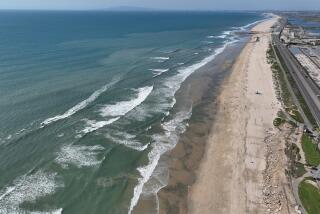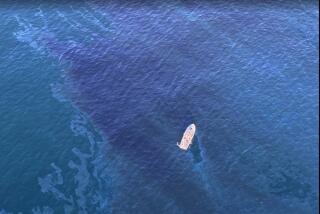Crews Use Pitchforks on Oil Globs : Cleanup Gear Clogged by Troublous Delaware River Spill
- Share via
WASHINGTON — Hundreds of National Guardsmen and other cleanup workers resorted to shovels and pitchforks Monday to collect beach-ball-sized globs of heavy heating oil that clogged sophisticated skimmers on the Delaware River.
The Delaware River mishap, combined with almost simultaneous spills in Rhode Island and Texas, put pressure on Congress to limit oil exploration and prompted the Bush Administration to reconsider the nation’s dependence on oil tankers.
The Delaware spill proved to be the most troublesome of the three accidents, which dumped a total of 1.5 million gallons of oil into U.S. waters. A 25-mile stretch of the Delaware River’s surface south of Philadelphia remained marred by an 840,000-gallon leak from a Uruguayan tanker that ran aground early Saturday.
Hopes that the tendency of the heavy oil on the Delaware to form into lumps might mitigate environmental damage were dealt a blow late Monday when officials discovered about 35 oil-covered Canada geese in a Delaware lagoon. The geese were to be treated at a nearby bird rescue center.
‘Like Molasses’
Wildlife officials said they believed that the birds had been affected when the oil floated ashore and melted in the hot afternoon sun. “It’s like molasses or fly paper once it hits you,” said Dick Nugent of the U.S. Fish and Wildlife Service.
Only one bird--a pigeon--was believed to have died as a result of the Delaware spill. But officials feared for the safety of a large colony of geese and other birds that nest in the area, which includes Pea Patch Island, a major nesting area.
The 300 National Guardsmen and 250 temporary workers hired by a private contractor to clean up the Delaware spill represented a tripling of the work force that had been in place Sunday, before difficulties in removing the coagulated oil persuaded officials to switch tactics. The cleanup process was expected to continue for at least another week.
In contrast to the slow going on the Delaware, the weekend’s two other major oil spills appeared well on the way to cleanup Monday evening.
In Rhode Island, a Coast Guard spokesman pronounced a 400,000-gallon leakage from a grounded tanker in Narragansett Bay “over” after nearly all of the light heating oil that had spread in a thin sheen across the water’s surface dissipated or evaporated.
And in Galveston Bay, Tex., a 250,000-gallon spill of thick Texas crude from a tanker that collided with a barge had been corraled into a small channel and two-thirds of it was vacuumed away before cleanup operations were slowed by high winds and heavy rain from Tropical Storm Allison.
The Bush Administration focused on the involvement of tankers in all three mishaps, which came three months after a tanker ran aground in Alaska and dumped more than 10 million gallons of oil.
“Three spills in 24 hours--the answer lies in doing something about tankers,” Interior Secretary Manuel Lujan Jr. warned in a televised interview.
Interior Department officials said that the Administration would try to weigh the risks of carrying oil by tankers against the high cost of building safer oil pipelines under the sea. “The American public is going to have to decide which method we’re going to use to bring that oil to market,” said a Lujan aide, Steve Goldstein.
The Administration’s sharp criticism of oil tankers appeared designed in part to deflect attention from a new congressional attempt to impose a one-year moratorium on offshore oil drilling.
Advocates of the mandatory drilling halt, which is scheduled to be voted upon Wednesday by the House Appropriations Committee, said that the weekend’s oil spills had given new urgency to their effort.
“This has to drive home the fact that the oil companies simply are not prepared to handle oil spills,” said Rep. Leon E. Panetta (D-Monterey), the sponsor of the legislation. “These events, as tragic as they are, are going to be helpful in bringing support behind the moratorium.”
The measure, approved last week by a subcommittee, would halt new oil drilling activities along the California coast until October, 1991. It would also block drilling in major new tracts in Alaska’s Bristol Bay and off the coast of Florida and several mid-Atlantic states.
The Administration and its supporters contend that offshore drilling has a proven safety record and dismiss the proposed moratorium campaign as a stalling tactic.
“There’s no need to delay development of energy resources,” said White House spokesman Marlin Fitzwater. “But there is a need to move quickly and effectively on better techniques of dealing with oil spills.”
Because the major spills in Delaware and Rhode Island were caused by foreign tankers, proposals aimed at toughening the regulations that govern their operation also received considerable attention Monday.
One such plan, strongly backed by the Administration, would create an international liability fund to cover clean-up costs for oil spills caused by foreign tankers. Each tanker now must carry $14 million in liability insurance but costs can soar well beyond that amount, and reimbursement has not always been easy to come by.
Federal officials continued their investigations into the causes of the nearly coincidental accidents.
In the Rhode Island spill, a harbor pilot on his way to a rendezvous with the tanker tried to warn the ship it was heading into dangerous waters, but his radio message came too late, the New York Times reported in today’s editions.
The newspaper quoted Capt. Bruce B. Fisher, chairman of the Northeast Pilots Assn. of Newport, as saying that the harbor pilot, Capt. David G. Leonard, gave such an account to National Transportation Safety Board investigators.
In Delaware, Gov. Michael N. Castle said he was told by unidentified officials that the accident on the Delaware River was caused when the anchor of the Uruguayan tanker Presidente Rivera was dropped accidentally and the ship pivoted out of the well-marked shipping lane.
Coast Guard officials refused comment on the report, saying that a formal board of investigation would begin Wednesday. Separate public inquiries are scheduled to begin in Providence, R.I., today and in Houston later in the week.
Staff writers Bob Drogin in Newport, R.I., and Ronald J. Ostrow in Washington contributed to this report.
More to Read
Sign up for Essential California
The most important California stories and recommendations in your inbox every morning.
You may occasionally receive promotional content from the Los Angeles Times.












